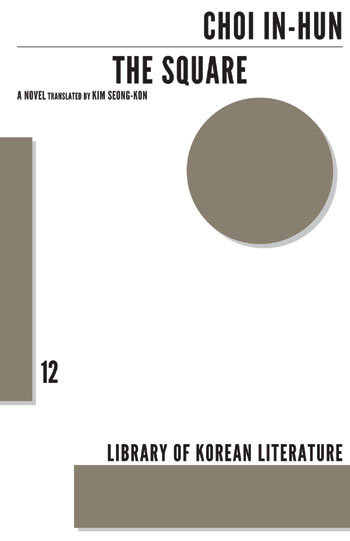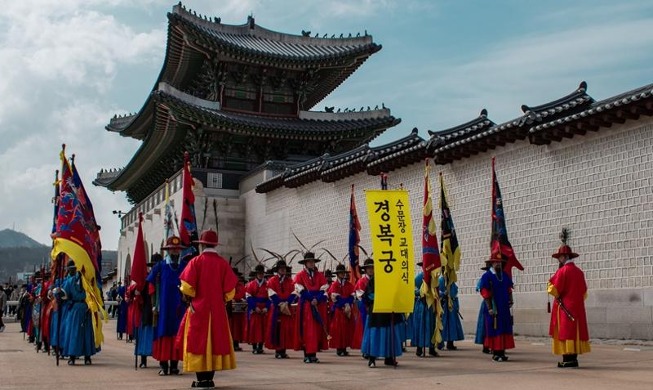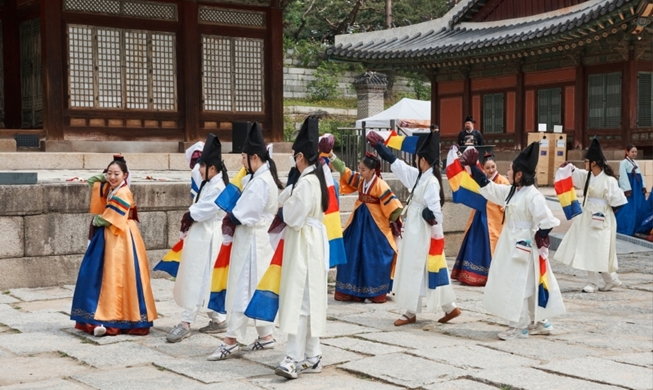-
 Korea.net's 24-hour YouTube channel
Korea.net's 24-hour YouTube channel- NEWS FOCUS
- ABOUT KOREA
- EVENTS
- RESOURCES
- GOVERNMENT
- ABOUT US
The following text is written by Barry Welsh, instructor of Sookmyung Women's University, for the "Korean Culture Experience" essay contest.
The English translation of Choi In-hun's celebrated novel ‘The Square’ provides English readers with an excellent opportunity to encounter one of the key texts of Korean literature. ‘The Square’ takes as its subject matter the ideological differences between North and South Korea. In its depiction of a psychologically conflicted protagonist searching for an ideology he can live by ‘The Square’ is arguably the first modernist text in Korean War literature. Upon its original publishing in 1961 it ushered in a new perspective on the Korean War, as well as marking the point at which a new era began in the history of Korean literature. Significantly the novel was published just a few short months after President Syngman Rhee’s government was overthrown by the April 19th student revolution in 1960. Were it not for the April Revolution it is likely the novel would not have been published and most definitely could not have been published under the Syngman Rhee administration during the 1950s; an avowedly anti-communist regime which made it impossible to criticize the political system in the South or to praise the political system in the North. For a short time after the revolution took place and before it came undone there was a window in which the dominant ideologies of both North and South could be discussed along with the possibility of a third way and what that might be. It was during this brief window that Choi managed to publish ‘The Square.’

‘The Square’ delivers a sustained critique of a Korean society blighted by the duelling ideologies of capitalism and communism. To juxtapose the differing ideologies Choi uses the two conceptual metaphors of ‘the square’ and ‘the private chamber.’ Broadly speaking ‘the square’ represents community thereby representing the communist North Korean political system, whereas ‘the private chamber’ represents individualism thereby standing in for the capitalist South Korean political system. Choi argues that both are vital aspects of a functioning society. In the preface to the 1961 edition he writes that ‘the square is indispensable to human lives…At the same time, humans cannot live without their own private chambers.’ What is important, Choi argues, is being able to travel between the two and the experiences we have along the way. It is this journey between ‘the square’ and ‘the private chamber’ that Choi sends his troubled protagonist on.
The disillusioned protagonist at the heart of Choi’s novel is Lee Myong-jun. A university student in the period just after the end of World War 2, Lee is repeatedly harassed by the South Korean police. They believe him a Communist sympathizer as his father willingly crossed over into North Korea after the Korean Peninsula's liberation. Struggling to reconcile the pervasive ideology of South Korea (‘the private chamber’) with his own, sometimes brutal reality whilst at the same time jaded by an empty love affair, he decides to travel down to Incheon. From here he smuggles himself into North Korea expecting to find his defector father living in a better society (‘the square’). Instead he finds his father living a life of privilege in a culture characterised by recrimination and self-denunciation. Although again jaded by the strictures of the society around him Lee nevertheless develops a nourishing relationship with a dancer called Eun-Hye whom he comes to love deeply. For a while they find contentment in one another despite their surroundings. But their lives inevitably change when the Korean War breaks out and they are both conscripted in the war effort; him as a soldier, her as a nurse. Finally, taken prisoner at the Nakdonggang River upon the war’s conclusion Lee is pressured by UN troops to choose either North or South Korea to be released to. He instead chooses neither, insisting on a neutral country, and so departs the Korean Peninsula on a boat bound for a third land. It is from here, on a boat travelling to India, that Choi begins to recount Lee’s story.
The novel finally indicates that Korean society needs to find a third way; a path that navigates between and ultimately transcends the entrenched ideologies of North and South, Left and Right, ‘the square’ and ‘the private chamber.’ Unfortunately, time and history have proven ‘The Square’ to be a remarkably prescient work of political philosophical fiction. In the 1989 preface Choi writes that Lee Myung-jun ‘lives in my mind because I still live in the same political situation as his.’ Unfortunately even now the differences between ‘the square’ and ‘the private chamber’ have not been resolved. South Korean society alone is caught between the entrenched views of left and right and the partisan arguments of progressives and conservatives. When Choi speculated what future Lee Myung-jun would have imagined for Korean society it is doubtful he would have imagined the one Korea is living at the moment.
The English translation of Choi In-hun's celebrated novel ‘The Square’ provides English readers with an excellent opportunity to encounter one of the key texts of Korean literature. ‘The Square’ takes as its subject matter the ideological differences between North and South Korea. In its depiction of a psychologically conflicted protagonist searching for an ideology he can live by ‘The Square’ is arguably the first modernist text in Korean War literature. Upon its original publishing in 1961 it ushered in a new perspective on the Korean War, as well as marking the point at which a new era began in the history of Korean literature. Significantly the novel was published just a few short months after President Syngman Rhee’s government was overthrown by the April 19th student revolution in 1960. Were it not for the April Revolution it is likely the novel would not have been published and most definitely could not have been published under the Syngman Rhee administration during the 1950s; an avowedly anti-communist regime which made it impossible to criticize the political system in the South or to praise the political system in the North. For a short time after the revolution took place and before it came undone there was a window in which the dominant ideologies of both North and South could be discussed along with the possibility of a third way and what that might be. It was during this brief window that Choi managed to publish ‘The Square.’

‘The Square’ delivers a sustained critique of a Korean society blighted by the duelling ideologies of capitalism and communism. To juxtapose the differing ideologies Choi uses the two conceptual metaphors of ‘the square’ and ‘the private chamber.’ Broadly speaking ‘the square’ represents community thereby representing the communist North Korean political system, whereas ‘the private chamber’ represents individualism thereby standing in for the capitalist South Korean political system. Choi argues that both are vital aspects of a functioning society. In the preface to the 1961 edition he writes that ‘the square is indispensable to human lives…At the same time, humans cannot live without their own private chambers.’ What is important, Choi argues, is being able to travel between the two and the experiences we have along the way. It is this journey between ‘the square’ and ‘the private chamber’ that Choi sends his troubled protagonist on.
The disillusioned protagonist at the heart of Choi’s novel is Lee Myong-jun. A university student in the period just after the end of World War 2, Lee is repeatedly harassed by the South Korean police. They believe him a Communist sympathizer as his father willingly crossed over into North Korea after the Korean Peninsula's liberation. Struggling to reconcile the pervasive ideology of South Korea (‘the private chamber’) with his own, sometimes brutal reality whilst at the same time jaded by an empty love affair, he decides to travel down to Incheon. From here he smuggles himself into North Korea expecting to find his defector father living in a better society (‘the square’). Instead he finds his father living a life of privilege in a culture characterised by recrimination and self-denunciation. Although again jaded by the strictures of the society around him Lee nevertheless develops a nourishing relationship with a dancer called Eun-Hye whom he comes to love deeply. For a while they find contentment in one another despite their surroundings. But their lives inevitably change when the Korean War breaks out and they are both conscripted in the war effort; him as a soldier, her as a nurse. Finally, taken prisoner at the Nakdonggang River upon the war’s conclusion Lee is pressured by UN troops to choose either North or South Korea to be released to. He instead chooses neither, insisting on a neutral country, and so departs the Korean Peninsula on a boat bound for a third land. It is from here, on a boat travelling to India, that Choi begins to recount Lee’s story.
The novel finally indicates that Korean society needs to find a third way; a path that navigates between and ultimately transcends the entrenched ideologies of North and South, Left and Right, ‘the square’ and ‘the private chamber.’ Unfortunately, time and history have proven ‘The Square’ to be a remarkably prescient work of political philosophical fiction. In the 1989 preface Choi writes that Lee Myung-jun ‘lives in my mind because I still live in the same political situation as his.’ Unfortunately even now the differences between ‘the square’ and ‘the private chamber’ have not been resolved. South Korean society alone is caught between the entrenched views of left and right and the partisan arguments of progressives and conservatives. When Choi speculated what future Lee Myung-jun would have imagined for Korean society it is doubtful he would have imagined the one Korea is living at the moment.













